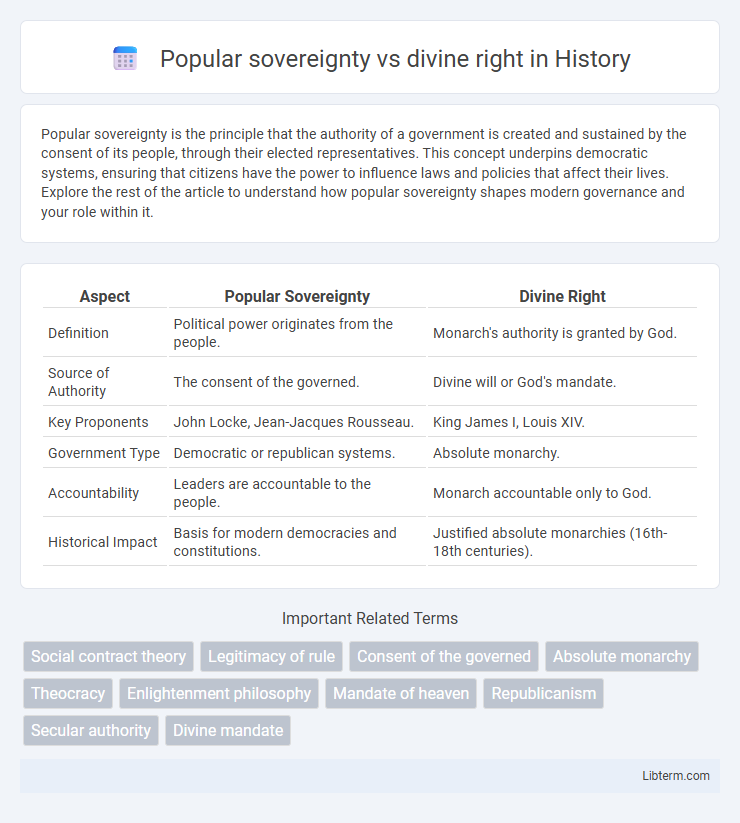Popular sovereignty is the principle that the authority of a government is created and sustained by the consent of its people, through their elected representatives. This concept underpins democratic systems, ensuring that citizens have the power to influence laws and policies that affect their lives. Explore the rest of the article to understand how popular sovereignty shapes modern governance and your role within it.
Table of Comparison
| Aspect | Popular Sovereignty | Divine Right |
|---|---|---|
| Definition | Political power originates from the people. | Monarch's authority is granted by God. |
| Source of Authority | The consent of the governed. | Divine will or God's mandate. |
| Key Proponents | John Locke, Jean-Jacques Rousseau. | King James I, Louis XIV. |
| Government Type | Democratic or republican systems. | Absolute monarchy. |
| Accountability | Leaders are accountable to the people. | Monarch accountable only to God. |
| Historical Impact | Basis for modern democracies and constitutions. | Justified absolute monarchies (16th-18th centuries). |
Introduction to Popular Sovereignty and Divine Right
Popular sovereignty asserts that political power originates from the consent of the governed, emphasizing the role of the people in legitimizing authority. Divine right, in contrast, claims that monarchs derive their authority directly from God, making their rule absolute and unquestionable. These contrasting theories underpin fundamental debates about the source and legitimacy of political power in historical and modern governance.
Historical Origins of Popular Sovereignty
Popular sovereignty originated during the Enlightenment as a political doctrine asserting that the authority of a government is created and sustained by the consent of its people, contrasting sharply with divine right, which justified monarchs' authority as God-given. Philosophers such as John Locke and Jean-Jacques Rousseau advanced the idea that legitimate political power resides in the collective will of the governed, leading to revolutionary movements like the American and French Revolutions. This shift redefined governance by emphasizing individual rights and democratic principles over hereditary absolutism.
The Roots of Divine Right Theory
The roots of divine right theory trace back to medieval Europe, where monarchs claimed their authority was granted directly by God, positioning themselves above earthly laws and accountable only to divine will. This concept justified absolute monarchy by asserting that rulers derived legitimacy from a sacred and immutable source, contrasting sharply with popular sovereignty, which bases political authority on the consent of the governed. Divine right theory influenced the political structure of nations such as France and England before the rise of Enlightenment ideals challenged this doctrine with the notion that legitimate power arises from the people's collective will.
Key Philosophers and Thinkers
John Locke championed popular sovereignty, arguing that government's legitimacy stems from the consent of the governed and natural rights to life, liberty, and property. Thomas Hobbes acknowledged absolute authority to prevent societal chaos but framed it as a social contract rather than divine ordination. Divine right theory was epitomized by Jacques-Benigne Bossuet, who asserted monarchs receive authority directly from God, making them accountable only to divine judgment.
Principles of Popular Sovereignty
Principles of popular sovereignty emphasize that political power originates from the people, who hold ultimate authority in governing themselves through elected representatives or direct participation. This concept contrasts with divine right, which asserts that monarchs derive their legitimacy from a higher, supernatural authority rather than the consent of the governed. Popular sovereignty underpins democratic systems by affirming that government legitimacy depends on the will and approval of the majority, ensuring accountability and preventing authoritarian rule.
Core Tenets of Divine Right
The core tenets of divine right assert that a monarch's authority is granted directly by God, making the king or queen the ultimate earthly ruler accountable only to divine judgment. This principle rejects any secular or popular authority, emphasizing obedience to the sovereign as a religious duty. Divine right justifies absolute monarchy by intertwining political power with sacred sanction, contrasting sharply with popular sovereignty that bases governance on the will of the people.
Popular Sovereignty in Modern Democracies
Popular sovereignty in modern democracies asserts that political power originates from the will of the people, emphasizing citizen participation and collective decision-making through elections and referenda. This principle underpins constitutional frameworks, ensuring governments operate with legitimacy derived from the consent of the governed rather than hereditary or divine authority. In contrast to divine right, popular sovereignty fosters accountability, transparency, and the protection of individual rights within democratic institutions.
Divine Right in Monarchical Systems
Divine Right in monarchical systems asserts that the monarch's authority originates directly from God, making their rule absolute and unquestionable by earthly powers or subjects. This concept legitimizes monarchy by claiming that the king or queen's decisions are divinely sanctioned, often supported by religious doctrine and church authority. Historically, divine right justified centralized control and suppressed dissent, reinforcing the monarch's position above secular laws and popular will.
Major Conflicts and Revolutions Influenced
Popular sovereignty, rooted in the belief that political power derives from the consent of the governed, fueled major conflicts such as the English Civil War and the American Revolution by challenging monarchic authority. The divine right of kings, asserting that monarchs derive authority directly from God, sparked resistance and revolutions when rulers overstepped traditional bounds, notably seen in the French Revolution. These opposing ideologies fundamentally shaped the rise of constitutional governments and the decline of absolute monarchies across Europe and the Americas.
Lasting Impact on Contemporary Governance
Popular sovereignty established the foundation for modern democratic systems by emphasizing that political power originates from the consent of the governed, leading to widespread adoption of representative institutions and constitutional rule. In contrast, the divine right of kings, which justified monarchical authority as God-given and absolute, declined significantly, shaping contemporary debates on legitimacy and the separation of church and state. The lasting impact on contemporary governance includes the prioritization of citizen participation, rule of law, and accountability, rooted firmly in the principles of popular sovereignty rather than inherited or divine decree.
Popular sovereignty Infographic

 libterm.com
libterm.com